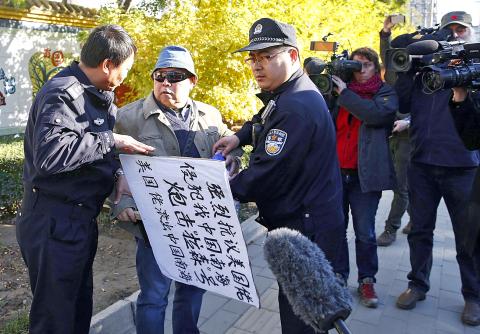The Chinese and US navies yesterday were set to hold high-level talks over tension in the South China Sea after a US warship challenged China’s territorial assertions in the disputed waters this week.
US chief of naval operations Admiral John Richardson and his Chinese counterpart, Admiral Wu Shengli (吳勝利), were to hold an hour-long video teleconference yesterday, a US official said.
A spokesman for China’s Ministry of National Defense said that Wu would present China’s “solemn position on the US vessel’s entry without permission” into waters in the Spratly Islands (Nansha Islands, 南沙群島), which Taiwan also claims.

Photo: EPA
Both officers initiated the meeting to discuss recent operations in the South China Sea and naval ties, the US official said. It will be the third video teleconference between the countries’ naval chiefs.
Beijing rebuked Washington for sending a guided-missile destroyer within 12 nautical miles (22.2km) of one of China’s artificial islands in the Spratlys on Tuesday, saying it had tracked and warned the USS Lassen and called in the US ambassador to protest.
“We would urge the US side not to continue down the wrong path,” ministry spokesman Yang Yujun (楊宇軍) told a regular briefing. “But if they do, we will take all necessary measures in accordance with the need.”
Chinese President Xi Jinping (習近平) will next week visit Vietnam, another vocal claimant in the South China Sea, and Singapore, while Chinese Minister of National Defense Chang Wanquan (常萬全) is to attend a meeting of Southeast Asian defense chiefs in Malaysia.
The patrol was the most significant US challenge yet to territorial limits China claims around its artificial islands in one of the world’s busiest sea lanes.
Separately, the English-language China Daily reported that Admiral Harry Harris, commander of US forces in the Pacific, is to visit Beijing next week. It cited an unnamed source and gave no further details.
Yang said the plan was for Harris to visit before the end of the year, and that both sides remained “in communication” about it.
A US embassy spokesman declined to comment.
Harris has been highly critical of China’s island building in the Spratlys. This year he said China was using dredges and bulldozers to create a “great wall of sand” in the South China Sea.
Meanwhile, German Chancellor Angela Merkel, who is on a two-day visit to Beijing, yesterday expressed concern over the territorial dispute and suggested China go to international courts to resolve the row.
“The territorial dispute in the South China Sea is a serious conflict. I am always a bit surprised why in this case multinational courts should not be an option for a solution,” Merkel said in a speech in Beijing.
“Nevertheless, we wish that the sea trade routes stay free and safe, because they are important for all,” she said.
Despite criticism of China’s action in the South China Sea, foreign navies from the US to Europe have sought to build ties with their Chinese counterparts.
A French frigate docked at China’s main South China Sea base in Guangdong Province on Wednesday on a four-day visit. It will participate in a maritime exercise about accidental encounters at sea.
Two Australian warships will also hold exercises with the Chinese navy in the South China Sea next week, Australian Minister of Defence Marise Payne said yesterday.

The Central Election Commission has amended election and recall regulations to require elected office candidates to provide proof that they have no Chinese citizenship, a Cabinet report said. The commission on Oct. 29 last year revised the Measures for the Permission of Family-based Residence, Long-term Residence and Settlement of People from the Mainland Area in the Taiwan Area (大陸地區人民在台灣地區依親居留長期居留或定居許可辦法), the Executive Yuan said in a report it submitted to the legislature for review. The revision requires Chinese citizens applying for permanent residency to submit notarial documents showing that they have lost their Chinese household record and have renounced — or have never

A magnitude 5.6 earthquake struck off the coast of Yilan County at 12:37pm today, with clear shaking felt across much of northern Taiwan. There were no immediate reports of damage. The epicenter of the quake was 16.9km east-southeast of Yilan County Hall offshore at a depth of 66.8km, Central Weather Administration (CWA) data showed. The maximum intensity registered at a 4 in Yilan County’s Nanao Township (南澳) on Taiwan’s seven-tier scale. Other parts of Yilan, as well as certain areas of Hualien County, Taipei, New Taipei City, Taoyuan, Hsinchu County, Taichung and Miaoli County, recorded intensities of 3. Residents of Yilan County and Taipei received

Taiwan has secured another breakthrough in fruit exports, with jujubes, dragon fruit and lychees approved for shipment to the EU, the Ministry of Agriculture said yesterday. The Animal and Plant Health Inspection Agency on Thursday received formal notification of the approval from the EU, the ministry said, adding that the decision was expected to expand Taiwanese fruit producers’ access to high-end European markets. Taiwan exported 126 tonnes of lychees last year, valued at US$1.48 million, with Japan accounting for 102 tonnes. Other export destinations included New Zealand, Hong Kong, the US and Australia, ministry data showed. Jujube exports totaled 103 tonnes, valued at

BIG SPENDERS: Foreign investors bought the most Taiwan equities since 2005, signaling confidence that an AI boom would continue to benefit chipmakers Taiwan Semiconductor Manufacturing Co’s (TSMC, 台積電) market capitalization swelled to US$2 trillion for the first time following a 4.25 percent rally in its American depositary receipts (ADR) overnight, putting the world’s biggest contract chipmaker sixth on the list of the world’s biggest companies by market capitalization, just behind Amazon.com Inc. The site CompaniesMarketcap.com ranked TSMC ahead of Saudi Aramco and Meta Platforms Inc. The Taiwanese company’s ADRs on Tuesday surged to US$385.75 on the New York Stock Exchange, as strong demand for artificial intelligence (AI) applications led to chip supply constraints and boost revenue growth to record-breaking levels. Each TSMC ADR represents